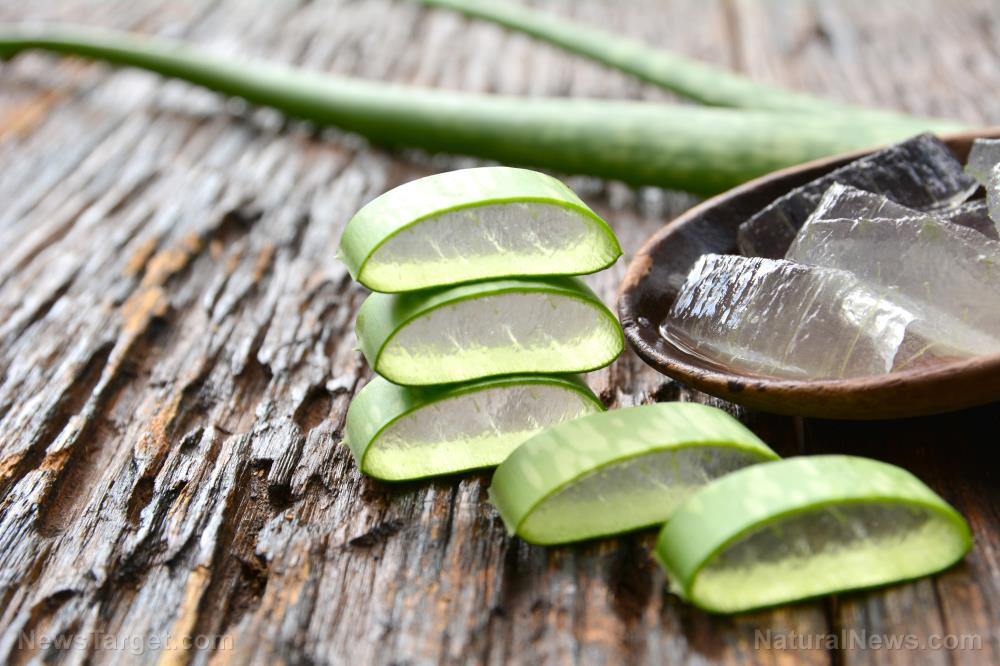Can aloe vera be used to treat sepsis?
04/17/2019 / By Michelle Simmons

Sepsis is a serious condition that can lead to organ failure or death if not treated immediately. A team of researchers from China and Japan explored the natural treatments for this disease and found that metabolites in the aloe vera plant can potentially be used to treat it.
In their study, they looked at the anti-inflammatory effects of aloe metabolites, particularly polyphenolic anthranoids, against sepsis in lab and animal trials. Earlier studies have shown that polyphenolic anthranoids are extensively broken down into glucuronides and sulfate metabolites by the gut and the liver. However, the anti-inflammatory potential of aloe metabolites has not been investigated.
For the study, the research team treated macrophages and septic mice with lipopolysaccharides (LPS) to induce inflammation. Then, they treated the cells and mice with aloe metabolites. After using various tests to determine inflammation, the Chinese and Japanese research team found that aloe metabolites suppressed the expression of inducible nitric oxide synthase (iNOS) and mitogen-activated protein kinases (MAPKs). Aloe metabolites also decreased the production of proinflammatory cytokines and nitric oxide.
In the mouse model of sepsis, they discovered that the treatment with aloe significantly reduced nitric oxide level and exhibited protective effects against sepsis-related death. The anti-inflammatory effects of aloe metabolites can be associated with the inhibition of inflammatory mediators.
Based on the findings of the study, the Chinese and Japanese research team concluded that aloe vera could be used in the treatment and prevention of sepsis. These findings were published in The American Journal of Chinese Medicine.
Things you need to know about sepsis
Sepsis occurs when the body’s response to an infection harms its own tissues and organs. While sepsis is a specific condition in itself, it is commonly caused by bacterial infection in the blood called septicemia.
Sepsis can occur to anyone, but children and the elderly are at a higher risk. People with a weakened immune system; those with chronic conditions such as diabetes, kidney, or liver disease, AIDS, and cancer; and those with a severe wound like severe burns are also at an increased risk for sepsis. The signs and symptoms of sepsis following a bad infection are often subtle and can be mistaken for those of other serious illnesses. However, sepsis may be suspected if a person experiences the following:
- Fever with chills and shivering
- Rapid heart rate
- Rapid rate of breathing
- Unusual levels of sweating
- Skin that feels unusually warm or cold
The Centers for Disease Control and Prevention (CDC) estimates that at least 1.7 million adults in the U.S. develop sepsis every year. Moreover, almost 270,000 Americans die because of sepsis each year. (Related: Teenager thought she just had a sore throat, found out her body was actually rotting away.)
Other uses for aloe vera
For thousands of years, the aloe vera plant has been used for medicinal purposes. Here are some of its health benefits:
- Keeps the skin healthy: Aloe vera is commonly used in skin care because of its ability to keep the skin clear and hydrated. It is also used as a topical treatment for burn wounds.
- May ward off cancer: The leaves of the aloe vera plant contains a compound called aloe emodin, which may help slow the growth of breast cancer, according to a study published in the journal Evidence-Based Complementary and Alternative Medicine.
- Treats digestive problems: This succulent is considered as a natural laxative. Studies have shown that it may aid in digestion and relieve constipation. It can also be used to relieve heartburn. However, it should not be used by people with Crohn’s disease, colitis, or hemorrhoids as it can cause abdominal cramps and diarrhea.
- Lowers blood sugar levels: Aloe vera juice may be beneficial to people with Type 2 diabetes. A study published in Phytomedicine: International Journal of Phytotherapy and Phytopharmacy suggested that consuming two tablespoons of aloe vera juice once a day can lower blood sugar levels. These findings were supported by another study published in Phytotherapy Research that used pulp extract.
NaturalMedicine.news has more on the medicinal properties of aloe vera.
Sources include:
Submit a correction >>
Tagged Under:
aloe vera, alternative medicine, anthranoids, anti-inflammatory, herbal medicine, Herbs, infection, infectious diseases, inflammation, medicinal plants, natural cures, natural medicine, remedies, research, sepsis
This article may contain statements that reflect the opinion of the author
RECENT NEWS & ARTICLES
Infections.News is a fact-based public education website published by Infections News Features, LLC.
All content copyright © 2018 by Infections News Features, LLC.
Contact Us with Tips or Corrections
All trademarks, registered trademarks and servicemarks mentioned on this site are the property of their respective owners.





















